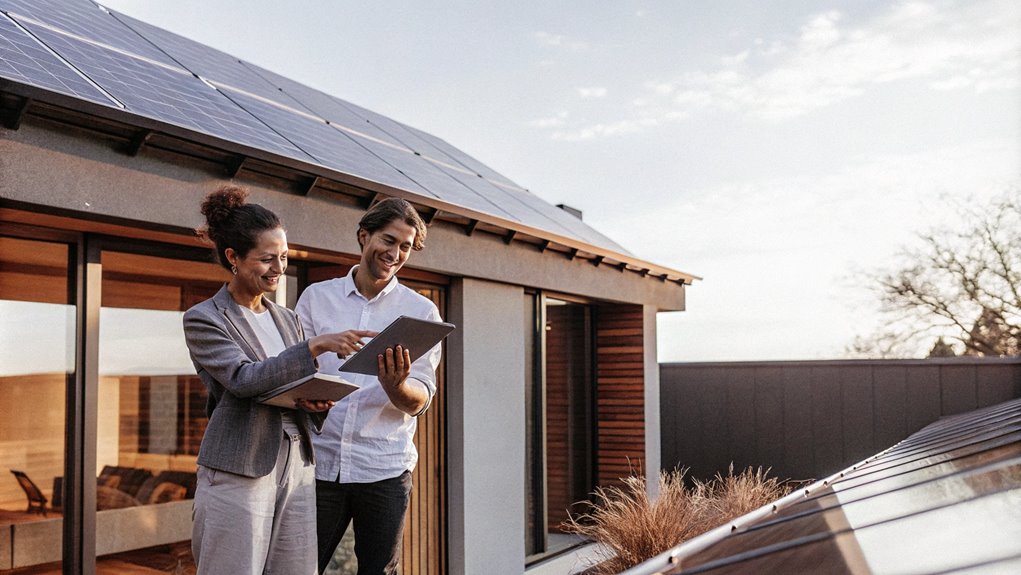Your house can help protect your money when prices go up. When you get a fixed home loan, your monthly payment stays the same. As time goes by, the loan gets easier to pay off. Since 1990, homes have grown in value by about 4% each year, which is more than other prices went up. You can make even more money by renting out rooms, since rent goes up faster than other costs. You can also fix up your home – like making your kitchen better. For every $100 you spend on fixes, you can get back $70-$80 later. These simple tricks can help your home guard your money when prices rise.
Understanding Real Estate During Inflation

When prices go up everywhere, owning a house can help protect your money. Houses often get more valuable when things cost more. Over many years, house prices have grown faster than regular prices.
If you own a house when prices rise, you win in two ways. Your house is worth more money, and you pay your home loan with dollars that are worth less.
Your monthly payment stays the same, but your house can make you more money if you rent it out. This helps keep your money safe when everything gets more expensive.
Fixed-Rate Mortgages as Protection
A fixed-rate home loan can help protect you when prices go up. Your monthly payment stays the same the whole time. While other people pay more for things, you keep paying the same amount each month.
Let's say you get a home loan for $300,000. You pay $1,896 each month. Even when prices go up a lot, you still pay $1,896.
Your house might be worth more money over time, but you keep paying the same amount. It's like paying back your loan with money that's worth less than when you first got it. This helps you save money in the long run.
Property Value Growth Patterns

Houses have grown in value over many years. Since 1990, homes in America have gone up in price by about 4% each year. This means a house that cost $100,000 back then is worth much more today.
Just like waves at the beach, house prices go up and down. Sometimes they rise fast, and other times they rise slow. Once in a while, prices even drop a little.
You can look at special charts that show how house prices change.
These charts tell us that homes are a safe place to put your money, even when money gets tight for many people.
Real Estate Price History
Houses in America have grown in value over many years. Since 1968, homes have gone up in price by about 4% each year. This means a house bought long ago is worth much more now.
Even when times were hard, house prices stayed strong. After big money problems in 2008, homes lost some value. But they got better and are now worth more than ever.
Some times were better than others for house prices. In the 1970s, houses went up a lot in value. They also went up well in the 2010s.
People who own homes can also make money by letting others live there and pay rent. This helps owners save more money than other ways of investing.
Market Appreciation Over Time
Houses go up in value over time, just like a savings account that grows. In good times, homes gain a little value each year. In great times, they gain a lot more value.
Think of it like this:
- Safe times: Houses go up 3-5%
- Good times: Houses go up 5-8%
- Hot times: Houses go up 8-12%
Most homes double in price about every 20 years. That means a $200,000 house could be worth $400,000 later.
Where your house is matters a lot. Houses in big cities often grow more in value than houses in small towns. New areas that are getting better, with more jobs and new stores, can see house prices jump up fast.
To find places where houses might go up in value, look for:
- More people moving in
- Lots of new jobs
- New roads and trains being built
Rental Income Opportunities
Renting out your home can help protect your money when prices go up. You can get money each month from renters while your house grows in value. When things cost more, you can charge more rent too.
There are many ways to make more money from your home. You could turn your basement into a place to rent. You could rent to people on vacation. You could even rent out your parking spot.
In most places, rent goes up faster than prices do.
Look at what other people charge for rent in your area. Keep your rent fair. This way, you can make money now and watch your house grow in value over time.
Home Equity Building Strategies

When you own a home, you can build wealth in two ways. First, your home can grow in value over time. Second, you can pay down what you owe on it.
To help your home grow in value, fix it up. Make your kitchen look better. Update old bathrooms. Add things that save energy. When you spend money on these fixes, you often get most of it back when you sell.
A smart way to pay less on your home loan is to pay every two weeks instead of once a month. This means you make 13 full payments each year, not just 12.
This helps you pay off your loan faster and save money.
Increase Property Value Fast
Your house can be worth more money fast with some smart changes.
First, fix up your kitchen and bathrooms. Put in new windows that save energy. These fixes will give you back most of the money you spend when you sell.
Want a quick boost? Make the front of your house look nice. Plant pretty flowers and trees. Paint the outside. Add bright new lights. These small changes can get you back all your money and more.
Fix any big problems with your house right away. Check the roof, pipes, and walls.
Add new tech like smart locks and alarm systems. Many people want these things now.
Look at other nice houses near you to see what changes work best in your area.
Strategic Mortgage Payment Plans
Making smart choices with your mortgage can help you own your home faster. When you split your monthly payment in half and pay every two weeks, you end up making one extra payment each year. This simple change can help you pay off your home four years sooner.
Try this easy trick: If you pay $1,450 each month, bump it up to $1,500. Put that extra $50 toward what you owe on the house.
When you get extra money, like tax refunds or work bonuses, use it to pay more on your house. If you put an extra $1,000 toward your loan in the early years, you can save $4,000 over time.
Tax Benefits of Homeownership
Buying a home can help you save money on taxes in three big ways.
When you pay your mortgage, you can write off the interest you pay if your loan is less than $750,000. This helps most in the first years when you pay more interest.
You can also take $10,000 off your taxes each year for what you pay in local property taxes.
The best part? When you sell your home, you won't pay taxes on up to $250,000 of your profit. If you're married, that goes up to $500,000.
To get this deal, you need to live in your home for at least two years out of the last five.
These savings help you build up your money and keep up with rising home costs.
Cost Control Through Energy Upgrades

Want to save money on your home bills? You can make smart changes that help. Start by putting solar panels on your roof – they use the sun to make power for free.
Add new insulation to your walls – it's like giving your house a warm blanket. Put in a smart thermostat that learns when to heat or cool your home.
These fixes pay for themselves! Good insulation can cut your bills by 20-30%. Solar panels help you save money for many years.
Smart thermostats know just when to turn the heat up or down, saving you 10-15% each year.
Making these changes is like putting money in your pocket. Your home stays comfy, and you spend less on power bills each month.
Solar Panels Save Money
Going solar can help you save money on your power bills. Think of solar panels as a shield that keeps your costs down when power companies raise their prices. Good panels work well for 20-25 years, and the maker will fix them if they break.
The cost to put solar panels on your home has gone way down. They now cost much less than they did in 2010, and they work better too.
You can get your money back in about 5-8 years by paying less for power. The government also gives you money back to help pay for them. After that, you get free power for 15-20 more years!
Insulation Reduces Energy Bills
Your home loses heat like a cup loses hot coffee without a lid. But good insulation acts like a cozy blanket for your house. It keeps the warm air in during winter and the cool air in during summer.
You can save money on your energy bills with the right insulation. Most people see their bills drop by 15-20% each year. That means more cash in your pocket!
| Insulation Type | Cost per Sq Ft | Energy Savings |
|---|---|---|
| Fiberglass | $0.75-1.50 | 30-50% |
| Spray Foam | $3.00-7.00 | 50-70% |
| Cellulose | $1.20-2.00 | 40-60% |
The best places to add insulation are your attic, walls, and the space under your house. Many families who add insulation see their money come back in saved energy costs in 3-5 years. Think of it like putting on a warm jacket – your house will feel better, and your wallet will too!
Smart Thermostats Cut Costs
Your home can save money with a smart thermostat. It learns when you like your home warm or cool. Think of it as a helper that knows just what you need.
The smart thermostat looks at the weather and changes the heat or air on its own. Most cost about $200, but the money you save on bills pays for it in two years.
You can even use your phone to make it warmer or cooler when you're away.
Want to save more? Put in a smart thermostat with other ways to save power.
Many power companies will give you money back when you buy one. They might pay you $50 or even $100 to help you save more.
Real Estate Market Cycles
The housing market goes up and down like a seesaw. It follows a simple pattern that helps people make smart choices with their money.
Think of it like the seasons. First comes growth, when homes cost more and builders make new houses. Next, too many homes get built. Then tough times hit, and home prices drop. Last comes healing, when things start to get better.
Smart people watch these patterns. They buy homes when prices are low. They wait while prices go up. Then they sell before prices fall again. This helps their money grow and stay safe when things cost more at the store.
Leveraging Home Equity

Your home is like a piggy bank that grows over time. As you pay your mortgage, you own more of your home. This gives you money power!
You can borrow money using your home in two ways. One is a home line of credit. The other is taking cash from a new home loan. These loans cost less than credit cards.
You can use this money to do smart things. Fix up your home to make it worth more. Buy a second home to rent out. Or pay off bills that cost you too much.
Some people use their home money to buy more homes when prices are low. This can help them make more money over time.
But be careful! Never borrow more than 80% of what your home is worth. This keeps you and your home safe.
Property Improvements and Value
Your home can be worth more when you make smart changes to it. Think about fixing up your kitchen – for every $100 you spend, you could get back $70 or $80 when you sell. Fixing bathrooms is good too, giving back $60 to $80 for each $100 spent.
New things that save power, like better heating and cooling systems, make your home worth more. They also help you save money each month on bills.
Look at what other homes in your area have. This helps you pick the best changes to make. Adding space in your basement or building new rooms can give you back $50 to $65 for every $100 spent.
Outdoor spaces like decks are very popular now. They can give back $65 to $75 for each $100 you put in.
Keep all papers that show the work you did. These papers help prove your home is worth more when you want to sell it or get a new loan.
Long-Term Investment Benefits

Owning a home helps you grow money over many years. When you fix up your home, it's worth more right away. But the best part is how your home gets more valuable as time goes by. Since 1991, homes have grown in value by about 4% each year.
Every time you pay your mortgage, you own more of your home. This helps you save money without thinking about it. You can also pay less in taxes because you own a home.
When you rent, your payments go up over time. But with a home loan that has a fixed rate, you pay the same amount each month.
Home values usually go up faster than other costs of living. This means your home helps protect your money and can help your family for years to come.
Location and Market Dynamics
Living in a good spot helps your home grow in value faster than prices go up. The best places are where lots of people want to live but not many homes are for sale. These areas often have many jobs and more people moving in.
Look for homes near big companies, good schools, and shops. Houses close to buses and trains gain more value than homes far away. Pick areas where home prices stay strong or keep going up.
Some places have rules that make it hard to build new homes. These spots often keep their value when times are tough and do better when things get good again.







